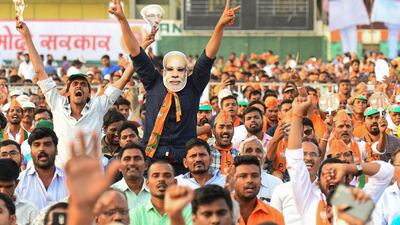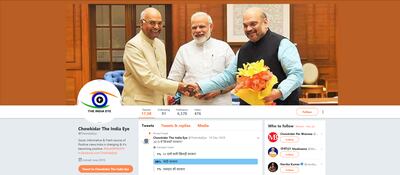Facebook said on Monday that it had removed hundreds of pages conducting social media warfare between India's two largest parties, less than two weeks before the country's general election.
About $110,000 (Dh404,000) in advertising was spent over five years between operations advocating for the ruling Bharatiya Janata Party and its rival, Congress.
The company also removed more than 100 pages operated by the propaganda arm of the Pakistani military, primarily about the disputed territory of Kashmir.
Searches by The National show that sister pages of the operations still operate on Twitter, continuing to push partisan content throughout Monday, and back-up pages also exist on Facebook.
Nathaniel Gleicher, head of Cyber-Security Policy at Facebook, said the company removed the pages because those operating them were trying to "mislead others about who they were and what they were doing", not because of the content.
Facebook called it "co-ordinated inauthentic behaviour" and said it removed more than 600 pages and accounts linked to an IT cell of Congress, the main Indian opposition party.
The pages, operated by members of Congress's "cyber army", spent about $39,000 in targeted advertisements over nearly five years. Some made their allegiance to Congress explicit but it was hidden in others.
Facebook also removed 15 pages, groups and accounts associated with an Indian IT firm, Silver Touch, which pushed pro-BJP content.
It focused on a single brand – The Indian Eye – which had more than 2.6 million likes on its Facebook page and a presence on Instagram.
Sample posts show content praising the Indian government for a recent test of an anti-satellite missile test in which Prime Minister Narendra Modi declared India a "space superpower".

Almost 5 million rupees (Dh257,000) was spent by the pages and accounts between June 2014 and February 2019.
Ben Nimmo, a fellow at the Atlantic Research Council, who studied the pages before they were taken down, told The National the pro-Congress network did not try to hid its operations, but the pro-BJP campaign had a level of deniability.
Facebook's investigation traced the page to Silver Touch, but had not managed to link them directly to the BJP.
Mr Nimmo was sceptical of the company's independence.
"Would a commercial company that has overtly done stuff for the BJP start running a very high-following set of covert accounts also supporting the BJP, without the BJP knowing about it?" he asked.
Each operation's posts struck a different tone. The Congress content was satirical and across most metrics less successful, while the pro-BJP operation published vitriolic posts against opponents and glorified Mr Modi, gaining a higher level of engagement.
'The India Eye' still active
Despite the pages being removed, The India Eye still has a presence across social media channels.
There are two versions of the page – one posting mainly in English and the other in Hindi – under the same name and logo, still live on Facebook. The pages have not posted any adverts and were created last year.
Mr Nimmo said these ages were backups.
"If you're running a big brand and you lose it, you want to be able to rebuild your audience as fast as possible and one way to do that is to have a backup," he said.
On Twitter, an account with the same logo and name "Chowkidar The Indian Eye", linked to the removed Facebook page and with #Modi4PM2019, continued to post Tweets on Monday, praising Mr Modi's economic progress and calling opponent Rahul Gandhi's policies "April Fools".
Twitter has different rules, Mr Nimmo said. The page might not have been breaking its rules, even though the platform knew about it, he said.
Silver Touch, the firm whose staff are accused of operating the page, also designed Mr Modi's application and the online portals for the Indian army and navy, but did not respond to repeated requests for comment.
Pakistani Military pages under the radar
Facebook also accused the public relations arm of the Pakistani military of operating dozens of Facebook pages and Instagram accounts.
The posts, recorded by the Atlantic Research Council, extolled the virtues of its military, spread anti-Indian themes about Kashmir and celebrated the official Pakistan Army spokesman, Maj Gen Asif Ghafoor.
The pages were created as early as 2011, indicating the military PR was an early adopter of the tactic. About 2.8 million accounts followed one or more of the 24 Facebook pages and 15 Instagram accounts.
One page was called "Kashmir for Kashmiris" while another, called "Painter's Palette", showed a cartoon of captured Indian fighter pilot Wing Cmdr Abhinandan Varthaman flying on a Pakistani dove of peace.

"They managed to fly under the radar for a very long time," Mr Nimmo said. "Frankly, a lot of it was pretty crude stuff.
"Given that this was an operation run by Army PR, the number of posts they had praising the man in charge of Army PR was pretty funny."
But again, despite being taken down from Facebook and Instagram, there are still accounts linking to and copying the Facebook pages.
There is a rich field of news sites, blogs and activists pages advocating for Pakistani sovereignty over Kashmir and it is often impossible to distinguish between the authentic and what Facebook calls "co-ordinated, inauthentic behaviour".
Searches of Facebook, Twitter and Instagram find dozens of pages appearing as news sites in Kashmir.
These revelations will make it harder for genuine activists in the disputed region, Mr Nimmo said.
"Now we have found that the Pakistani Army has been running pages and masquerading as pro-Kashmiri groups, the real pro-Kashmiri groups are going to have a hard time proving that they're not army related," he said.






